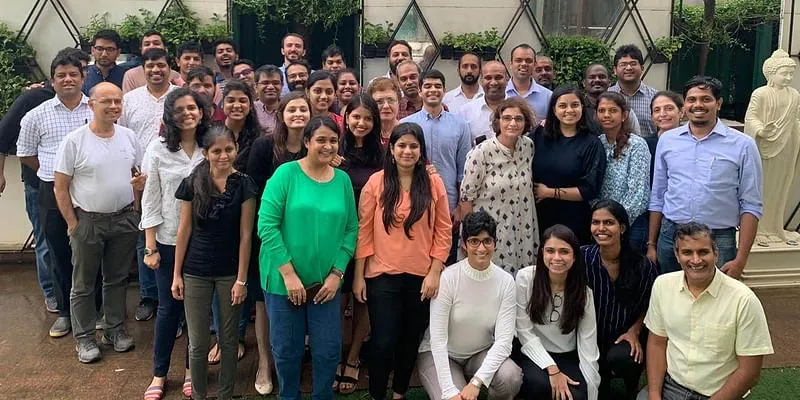This company is helping businesses reimagine social change
FSG is a global consulting firm that partners with foundations and corporations to drive sustainable social change.
There is a lot of philanthropic work taking place around the world, but there is little thought on how the money is being utilised and whether it is really creating an impact.
Professors Michael Porter and Mark Kramer, Co-founders of , a global, mission-driven consulting firm, believe that rather than separating good from the business, one needs to strategise good business.
Founded in 2000, Boston-based FSG partners with foundations and corporations to create equitable systems of change.
FSG came to India in 2010 with four employees, and currently, the Mumbai-headquartered firm has a team of 45 people, including senior consulting professionals.

FSG team in India
Rishi Agarwal, Managing Director and Head, Asia FSG, says, “We do not believe that CSR alone will be able to make the cut. Two percent of profit is all they need to spend as part of CSR. But that alone cannot change or create an impact in the world. For it to happen, the core business has to change, new business models need to be created, which can help gain profit as well as create value to the society.”
With a global team of 160 people in six offices across three continents, FSG claims to have helped over 600 brands, including Godrej Group, Eli Lilly & Company, Hindustan Unilever Limited, Citigroup, Toyota, Microsoft, etc.
ALSO READ

The core focus
At FSG, Rishi leads the Inclusive Markets and Water Access, Sanitation, and Hygiene (WASH) practices globally, in addition to leading the firm’s work in Asia. He has worked across WASH, healthcare, FMCG, automotive, agriculture, and clean energy sectors in India.
Rishi focuses on leveraging his experience in the corporate world to use market-based solutions to drive sustainable social change and work with corporates to address relevant social needs, with profitability as a central theme in their growth agenda.
The core idea is to restructure company strategies and help them drive with a purpose. FSG serves as a strategic advisor to corporates, offering structured, flexible and adaptable project management plans, developing customised solutions, blending research, strategy, learning, and evaluation.
While choosing the companies, the main criteria that FSG looks for is that the brands need to be serious about going beyond profits and creating shared value--they need to have a clear purpose led motive.
“Otherwise, for advice in business strategies, there are enough consulting firms in the market. We don’t fall in that category,” says Rishi.
Working with companies
PSI, a global non-profit organisation that has supported family-planning efforts in India, hired FSG to conduct a study on family-planning in India.
The objective was to identify the key market failures preventing women and girls in India from adopting family planning products and services, and recommend opportunities for strengthening the market.
FSG studied the value chains and supporting environments of 5 common family-planning products and services: condoms, oral contraceptive pills, IUD, sterilization, and emergency contraception.
With this, it developed a comprehensive landscape assessment highlighting the key barriers to success faced by individual actors, as well as the market as a whole. FSG facilitated a workshop with various PSI offices to collaboratively discuss the research and explore opportunities for impact.
Till now, FSG has worked with a large portion of Fortune 100 companies including Aetna, Citigroup, Lilly, Toyota, GE, Goldman Sachs, HP, Intel, The Coca Cola Company, Merck, Microsoft, Pfizer and UPS.
Furthermore, the consulting firm’s work has impacted the lives of over 5 lakh individuals and influenced over $75 million in investments and funding.
The duration at which FSG works with each company varies from project to project. It can be anywhere from three months to many years. The firm also works with companies under MoU for projects like child education, creating livelihood opportunities for women, etc. Rishi clarifies that these projects are done for non-monetary benefits.
Creating impact
FSG assists companies to re-imagine their existing systems to make them more inclusive and sustainable in their operations.
“Our understanding of the interconnectedness of social impact efforts is based on our global experience working on a wide range of issues--from health and education to workforce mobility and market improvement. We work closely with clients and stakeholders to develop customised solutions, blending research, strategy, learning, and evaluation based on the budget and ideas discussed,” says Rishi.
“The impact can be seen from new messaging by brands (with gender as a focus) to new products (low unit packs/ specially designed products for specially-abled) and reorganisation of supply chains that companies have undertaken over the years. The shift towards converging business goals with social goals has never been more resounding, and this is exactly what FSG fulfils as a mission-driven consulting firm,” he explains.
According to him, the next phase is likely to see a new age of corporations actively transforming the market to make it more sustainable, leading to a cusp of business and social responsibility. This puts the onus on Indian companies to imagine the longer-term impact of the business, and also how they conduct their operations.
FSG competes with the likes of BCG and US-based Dalberg Global Development Advisors.
(This story was updated to correct outdated data.)
Edited by Megha Reddy







